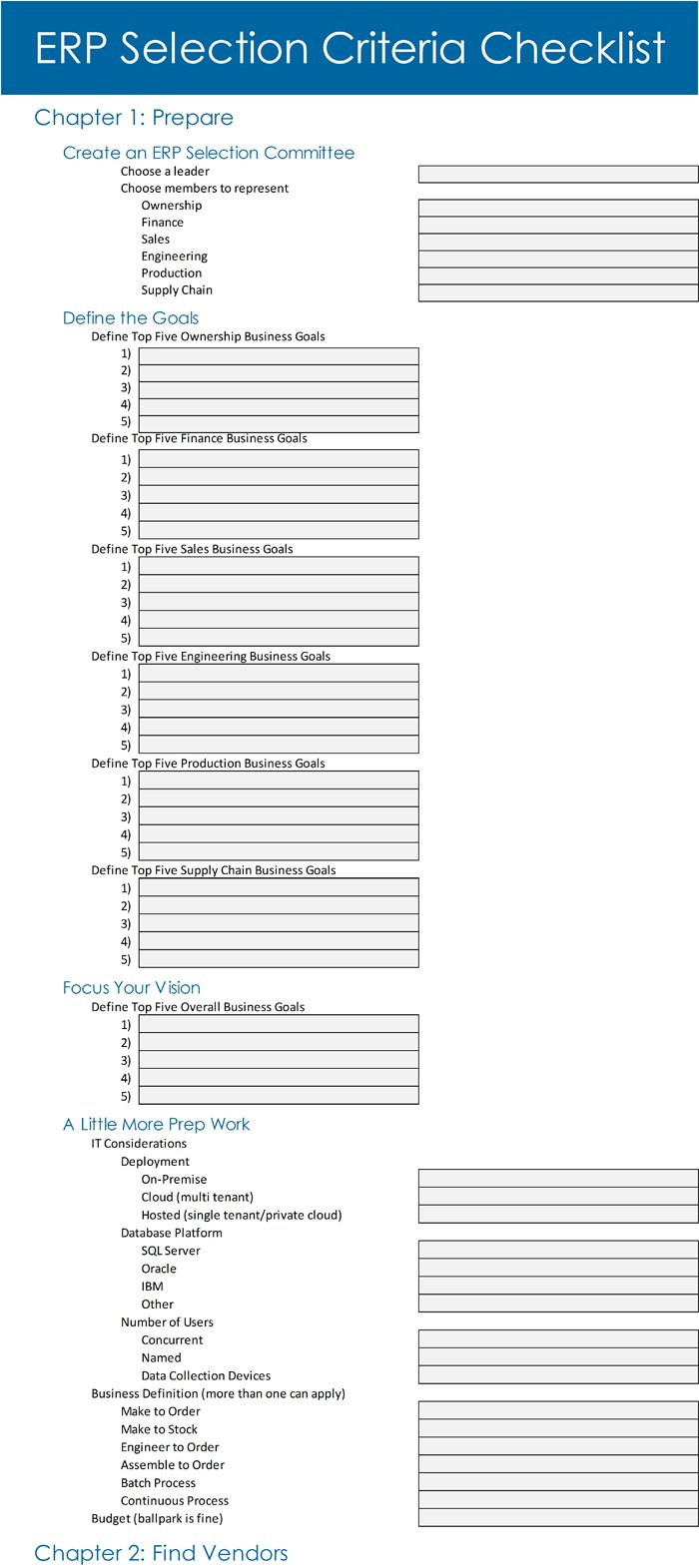ERP software assessments provide answers to your questions
Visual South assists companies with ERP assessments and implementations every day, and has since 1993. It’s what we do and we have been through the evaluation process hundreds of times.
However, companies typically only evaluate ERP software every 10 to 15 years (if that). The ERP selection team members may have never evaluated software, or may have done so only once before. This leads to the development of disparate processes -- some are good and others not so good. The Visual South team can help regardless.
Our team takes a consultative approach with companies, and can help create a solid ERP evaluation process and template to ensure you maximize your time looking for the right-sized application to meet your business needs.
A big part of ERP evaluation is knowing the right questions to ask. The questions need to be well-thought-out because it can be challenging to differentiate between all the ERP providers and products on the market. You want to be able to quickly identify which products are a viable option.
A common mistake is to either look at products that do not provide a complete functional footprint and will limit growth; or conversely, to look at a brand name like SAP and assume it will easily fit into small or medium-sized organizations, when it is actually too big and complex for the business requirements. NetSuite is another product often considered due to brand recognition, but it is notoriously weak at addressing manufacturers’ core needs without partner products and add-ons.
Similarly, companies can make mistakes by being insistent on a cloud deployment or on-premise deployment based on assumptions, rather than true best fit.
How do you ensure you are looking for the right solution?
Prepare in advance to discuss your project with ERP vendors.
Answer these four questions to evaluation an ERP system:
|
We take you through each ERP evaluation question in more depth below.
1. What are your goals with a properly implemented new ERP system?
Having a clear end goal is critical. Simply replacing what you have will not help. Areas causing issues and limiting business efficiency and growth need to be identified. Also consider how an ERP could support your company’s overall strategic goals.
In your ERP evaluation template, identify your top 5-10 goals, and have the ERP vendors address how their systems can solve the most important issues up front. This will provide clarity and an easier apples-to-apples comparison. If you allow the ERP vendors too much latitude, many will propagate their strengths, create clutter and noise, and make it hard to stay focused on whether the system can help accomplish your most important business goals.
I cannot emphasize this enough: If you do not bring your goals to the initial meeting with an ERP vendor, you will inevitably be turning over the priorities of your evaluation to each individual vendor. Over the years, I’ve seen many companies tell the vendor something along the lines of, “Show us what your software can do.” At that point, the vendor takes control. Yet the conversation is very different if a company walks into a meeting and says, “We have a lot of issues we want to solve, but after internal discussion, we believe that X and Y are most important. We would like to discuss how your ERP may be able to address these issues.”
This will turn your conversations into collaborative, problem-solving discussions that focus on what your company really needs. It’s very different than someone showing you a “cool” software feature that doesn’t solve any of your issues.
Note that if you are dealing with an experienced ERP partner, they will seek to understand your issues, and will also uncover issues you may not realize you have.
2. Do these ERP goals and defined business issues align with the executive team’s vision of what an ERP system should provide?
If the answer is no, then you may have trouble getting final approval for your project regardless of the software system selected. Ask yourself if the new system is solving the right people’s problems and matching their vision. If it isn’t, it’s highly probable you won’t get the budget to invest in a new ERP system. It happens every day. You must have executive-level support.
The timing of when you initiate an ERP evaluation is important, too. If you feel like you need a new ERP, but your executives with check-writing capabilities do not, it is best to flush this out prior to engaging vendors. Why?
When a company does an ERP evaluation, the team spends valuable time engaging with vendors, viewing demos, understanding implementation methodologies, costs, and so on. The team comes to a decision because they see how the solution will solve their problems, and they are excited about finally getting things fixed. This all comes to a screeching halt when someone on the executive team tells them they are not spending any budget on an ERP system. The team is then deflated and demoralized because they have seen a solution, and they cannot have it. Plus, they were likely pulled away from the regular duties to spend time and effort on the evaluation process, which has slowed down or stalled other internal projects.
Take the time to have an internal discussion with executives to get alignment on your ERP evaluation before you invest your team’s time with vendors.
Related: 3 Things to Consider When Choosing an ERP Development Company
Do you need an Application Process Review?How can you get the most out of the ERP system you've already invested in? It may be time for an Application Process Review (APR).
Book a time today for a no-cost, pressure-free discussion. |
3. How do you want to deploy the system?
During an ERP assessment, companies often tell us they want to go to the cloud. It’s a natural demand considering it’s all you see in the media. But that may not make the most sense for your company, so don’t rule out on-premise solutions. Ask the questions, or at least educate yourself on the topic, before venturing into an ERP evaluation that includes a cloud deployment. Many ERP vendors will try to steer you to what is most convenient for them instead what is in your best interests.
At Visual South, we have solutions that are deployable on the cloud and on premise, so we do not steer companies in either direction. We seek to understand their needs and educate them on the differences between cloud and on premise, so they can choose the best option for them.
See VISUAL ERP in action
See Cloudsuite Industrial in action
To learn more about why many manufacturers are transitioning to cloud-based ERP, please visit The Future of Cloud ERP for Manufacturing Companies
Related: Comparing ERP Cloud to On-Premise
4. What is the budget needed to purchase the ERP system that meets your business requirements?
We frequently work with companies who have an arbitrary budget that doesn’t take into account the size of the project. Most of the time, the budget is too small to truly address the business goals, solve specific business issues, develop best practices and procedures, and properly educate the user base on the new system. If corners are cut in any of these areas during the implementation, it often leads to an underwhelming return on investment.
In your initial conversations, vendors will typically give an idea of what it costs to implement their solution. To be fair, that cost can vary based on a lot of different factors, but each vendor should have a “normal” range. Protect yourself against prejudging solutions based on their cost by considering options out of your comfort zone early in your process. ERP software has flexibility on pricing, and keep in mind that this system is, at minimum, a 10-20 year investment. If you purchase an inexpensive system that you outgrow, you will be evaluating its replacement sooner than you think.
Start with an ERP evaluation template
If the four points above made sense to you, then check out our ERP evaluation template. It not only guides you through the entire process, but gives a strategy. It provides you with a plan.
There are two parts to the template.
- Our eBook "How to Select ERP...and not regret it": The eBook is free, it's a 10-20 minute read, and it can be downloaded here. It will provide clarity to you.
- Our checklist: "The ERP Selection Criteria Checklist": This follows the strategy of the eBook. Download it here. The download is a convenient spreadsheet. Here is a sample of what it looks like:

Visual South provides an extensive array of resources to educate on how to have an effective ERP assessment. Please let us know if you have questions. We are also happy to set up a free consultation to provide guidance on managing your ERP assessment and evaluation process.









